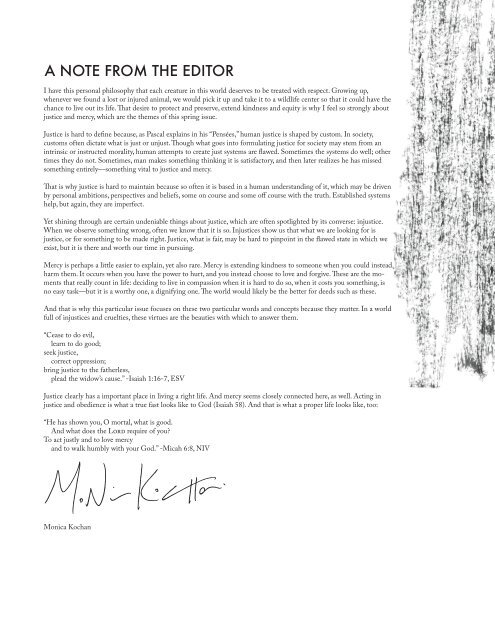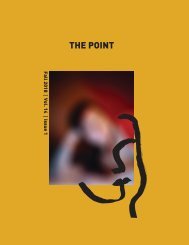The Point: Spring 2018
Spring 2018 | Volume 13 | Issue 2
Spring 2018 | Volume 13 | Issue 2
- No tags were found...
You also want an ePaper? Increase the reach of your titles
YUMPU automatically turns print PDFs into web optimized ePapers that Google loves.
A NOTE FROM THE EDITOR<br />
I have this personal philosophy that each creature in this world deserves to be treated with respect. Growing up,<br />
whenever we found a lost or injured animal, we would pick it up and take it to a wildlife center so that it could have the<br />
chance to live out its life. That desire to protect and preserve, extend kindness and equity is why I feel so strongly about<br />
justice and mercy, which are the themes of this spring issue.<br />
Justice is hard to define because, as Pascal explains in his “Pensées,” human justice is shaped by custom. In society,<br />
customs often dictate what is just or unjust. Though what goes into formulating justice for society may stem from an<br />
intrinsic or instructed morality, human attempts to create just systems are flawed. Sometimes the systems do well; other<br />
times they do not. Sometimes, man makes something thinking it is satisfactory, and then later realizes he has missed<br />
something entirely—something vital to justice and mercy.<br />
That is why justice is hard to maintain because so often it is based in a human understanding of it, which may be driven<br />
by personal ambitions, perspectives and beliefs, some on course and some off course with the truth. Established systems<br />
help, but again, they are imperfect.<br />
Yet shining through are certain undeniable things about justice, which are often spotlighted by its converse: injustice.<br />
When we observe something wrong, often we know that it is so. Injustices show us that what we are looking for is<br />
justice, or for something to be made right. Justice, what is fair, may be hard to pinpoint in the flawed state in which we<br />
exist, but it is there and worth our time in pursuing.<br />
Mercy is perhaps a little easier to explain, yet also rare. Mercy is extending kindness to someone when you could instead<br />
harm them. It occurs when you have the power to hurt, and you instead choose to love and forgive. <strong>The</strong>se are the moments<br />
that really count in life: deciding to live in compassion when it is hard to do so, when it costs you something, is<br />
no easy task—but it is a worthy one, a dignifying one. <strong>The</strong> world would likely be the better for deeds such as these.<br />
And that is why this particular issue focuses on these two particular words and concepts because they matter. In a world<br />
full of injustices and cruelties, these virtues are the beauties with which to answer them.<br />
“Cease to do evil,<br />
learn to do good;<br />
seek justice,<br />
correct oppression;<br />
bring justice to the fatherless,<br />
plead the widow’s cause.” -Isaiah 1:16-7, ESV<br />
Justice clearly has a important place in living a right life. And mercy seems closely connected here, as well. Acting in<br />
justice and obedience is what a true fast looks like to God (Isaiah 58). And that is what a proper life looks like, too:<br />
“He has shown you, O mortal, what is good.<br />
And what does the Lord require of you?<br />
To act justly and to love mercy<br />
and to walk humbly with your God.” -Micah 6:8, NIV<br />
Monica Kochan




